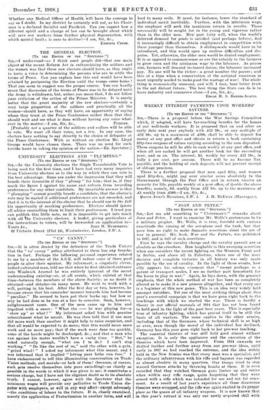THE GENERAL ELECTION.
[To THE EDITOR Or THE " SPECTATOR."] Sta,—I understood—as I think most people did—that one main object of the recent Reform Act in enfranchising the soldiers and the women was that these new electors should have, as they ought to have, a voice in determining the persons who are to settle the terms of Peace. Can you explain how. this end would have been attained by postponing the Election until the troops come home ? That you seem to suggest was the proper course.* You can hardly mean that discussion of the terms of Peace was to be delayed until the Army is withdrawn, but, unless you mean that, I do not follow your criticism of the action of the Prime Minister. It is surely better that the great majority of the new electors—certainly a very large proportion of the soldiers and practically all the women—should have, as they will have, an opportunity of saying whom they trust at the Peace Conference rather than that they should wait and see what is done without having any voice what- ever in the matter.—I am, Sir, &c., PUZZLED.
[Probably not a quarter of the soldiers and sailors will be able to vote. We want till their votes, not a few. In any case, the electors have nothing to say directly to the choice of delegates at the Peace Conference. With or without an election Mr. Lloyd George would have chosen these. There was no need for such terrific haste in taking the opinion of the nation.—En. Spectator.]










































 Previous page
Previous page